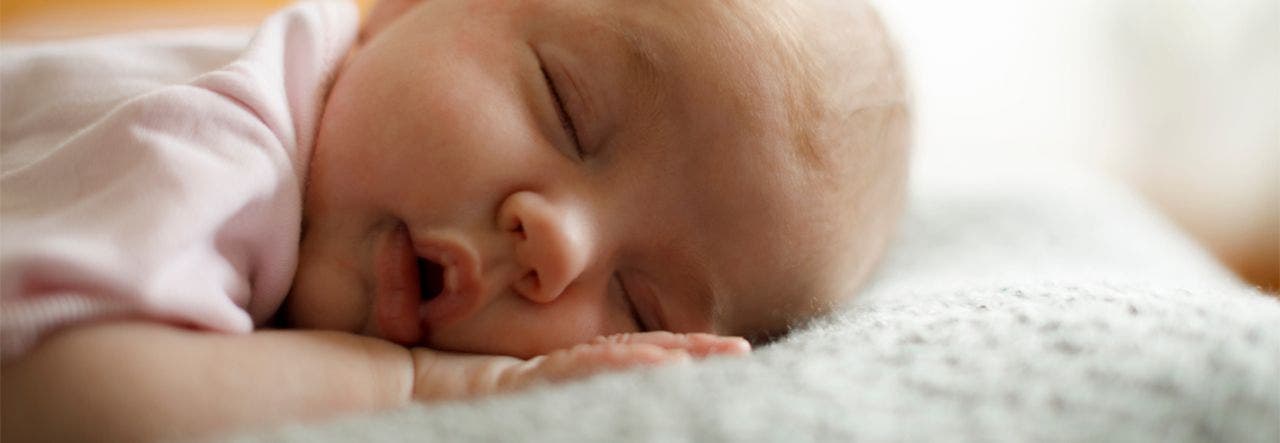Nothing really prepares you for the realities of parenthood, does it? However, the one message it seems all parents receive in advance is this: Baby WON’T sleep! And, chances are that this warning will be accompanied by all sorts of horror stories meshed with sleep advice.
Perhaps you’re feeling understandably overwhelmed by the wealth of newborn sleep information.
If you’re worried whether your little one’s sleep struggles are normal, you’re not alone. And, whether you’re considering sleep training your baby. or simply trying to weather the storm, getting accurate information about what “normal” infant sleep looks like is essential – as is sifting through the baby sleep tips.
As a veteran sleep coach, I’ve helped many families navigate newborn sleep. Let's take a closer look at some of the most common baby sleep myths … and learn the difference between fact and fiction.
MYTH #1: Giving Rice Cereal Will Make Baby Sleep Longer


FACT: This is one of the biggest myths. Rice cereal given to your baby before they are 4 months old does not help them sleep any longer. One study even found that children under 4 months who were given rice cereal in a bottle slept less!
Your baby is growing at an incredibly rapid rate, and the reality is that nighttime feedings area necessary part of their sleep pattern. There is no easy fix to make them feel full longer.
In fact, rice cereal digests quickly and doesn't sit in the stomach for very long. Introduce solid food when your child approaches 6 months of age, and it’s always a good idea to consult your child's doctor before starting solid foods.
MYTH #2: Keeping Baby Awake Later Helps Baby Sleep Longer
FACT: The longer babies are awake, the more tired they become. This is not necessarily a good thing! It may sound weird to us as adults, but overtired children can have a hard time falling asleep and remaining asleep.
If you keep your baby awake too long or purposely skip a much-needed nap, they will likely struggle to sleep and wake often. Oh, and those wake-ups can happen quickly and be very loud, which is hard on everyone. An overtired child will need a lot of help falling asleep and falling back asleep.
MYTH #3: Babies Should Sleep Through the Night by 4 Months


FACT: This is utter nonsense! How on earth does your baby know it is time to “sleep through?” Let's not even get started on what “sleeping through” is. Let's talk instead about YOUR baby.
Only you know your baby and what makes them who they are. They are a unique individual, so don't expect them to conform to outdated standards other people have set. Of course, some 4-month-olds sleep through the night, but the latest studies show that most do not.
While we're at it, your baby's weight also has little influence on when they will sleep through the night. That magical 12-lb marker? Yep, that's a myth, too.
MYTH #4: White Noise Is the Answer to Baby’s Sleep Issues
FACT: Sure, white noise may help your newborn sleep. But, using a fan or a white noise machine certainly doesn’t work for all babies. What’s more, as your child grows older, white noise may not be as effective as it once was, and your child may find it harder to sleep with the added noise. Babies go through sleep regressions and transitions a lot during your first few years together.
As your child's hearing matures, the high pitch of white noise may become annoying. Both pink and brown noise are easier to listen to as the highest pitch has been removed.
MYTH #5: Your Baby Will Sleep When They Are Tired


FACT: It sounds reasonable to think that when your baby is tired, they'll close their eyes and go to sleep. However, try to remember that your baby’s body and brain are still very much adapting to life outside of the womb. Most babies need help unwinding before they can fall asleep.
A short, relaxing 10–15 minute routine before a nap and a 30–45 minute routine before going to sleep at night will help prepare your child for sleep, and they'll have a much easier time falling and staying asleep. Learn more about why babies fight sleep.
MYTH #6: Sleep On-the-Go Is Not Quality Sleep
FACT: If your baby is sleeping soundly, they're sleeping soundly! It doesn't matter if they're in a stroller, a carrier, a carseat, your arms… As long as they sleep safely and soundly, you can't go wrong.
Sleeping in shorter spurts will help your baby avoid becoming overtired and will also give you a chance to snooze, relax or tackle your to-do list. Just remember that a firm, flat crib mattress is better for Baby’s safety and development for long stretches of sleep.
These are just a few of the sleep myths I’ve heard in my many years as a sleep consultant. What sleep myths do you know?
Interested in improving your own sleep, too? Check out these 6 sleep myths YOU need to put to bed right now!
 BABY
BABY  KIDS
KIDS  ADULT
ADULT  LEARN
LEARN  STORES
STORES 
